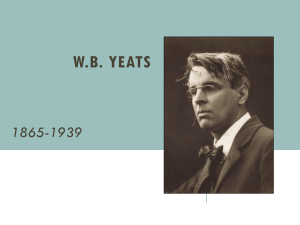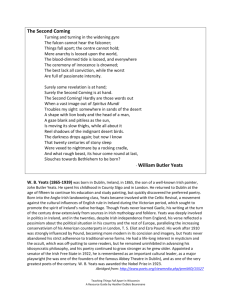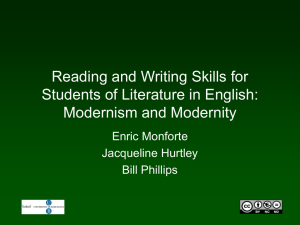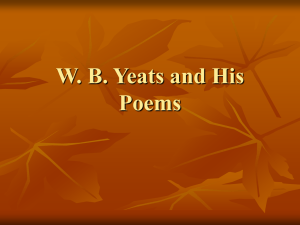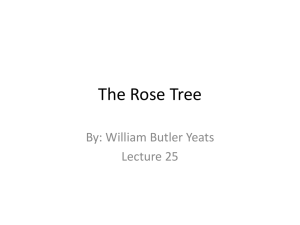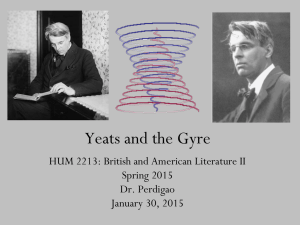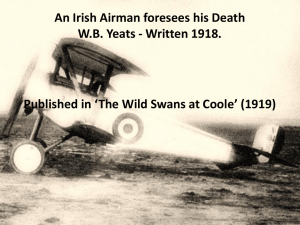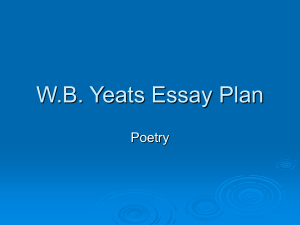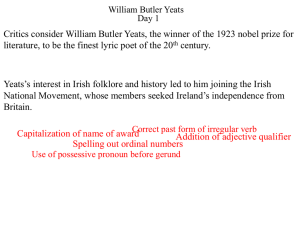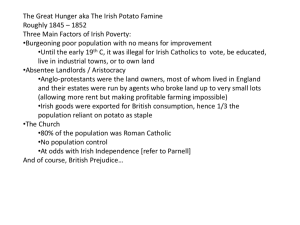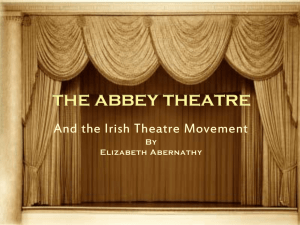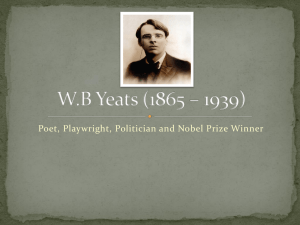W.B Yeats Powerpoint
advertisement
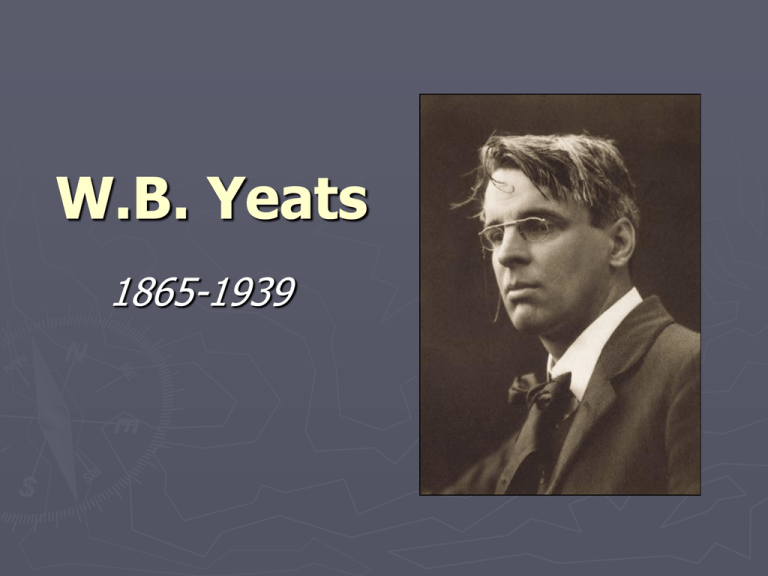
W.B. Yeats 1865-1939 Biographical Information ► “William Butler Yeats was an Irish poet and dramatist and one of the foremost figures of 20thcentury literature. A pillar of both the Irish and British literary establishments, in his later years Yeats served as an Irish Senator for two terms.” ► “In 1923, he was awarded a Nobel Prize in Literature for what the Nobel Committee described as ‘inspired poetry, which in a highly artistic form gives expression to the spirit of a whole nation;’ and he was the first Irishman so honoured.” SOURCE: <www.wikipedia.org> accessed on 30/06/09 Biographical Information ► Yeats also collaborated with Edwin Ellis on the first complete edition of William Blake’s poetry and writings. ► He maintained a life-long interest in mysticism, symbols and Irish mythology. ► Yeats was saddened and immensely moved by the tragedy of the Great War and the Irish Civil War. SOURCE: <www.wikipedia.org> accessed on 30/06/09 World War One 1914-1918 ► Also known as the “Great War” was a global military conflict that involved most of the world's great powers assembled in two opposing alliances: the Entente and the Central Powers.” ► “Over 70 million military personnel were mobilized in one of the largest wars in history.” ► “… ► In excess of 15 million people were killed, making it one of the deadliest conflicts in history. SOURCE: <www.wikipedia.org> accessed on 30/06/09 World War One 1914-1918 ► The enormous death and destruction caused by this war immensely affected Yeats. Irish Civil War (1922-1923) ► This was a conflict in Ireland in 1922-1923, about the nature of the new Irish Republic ► The conflict was waged between two opposing groups of Irish nationalists: the forces of the new Free State, who supported the Anglo-Irish Treaty under which the state was established, and the Republican opposition, for whom the Treaty represented a betrayal of the Irish Republic. ► The war was won by the Free State forces. SOURCE: <www.wikipedia.org> accessed on 30/06/09 Irish Civil War (1922-1923) It was an extremely violent conflict that cost close to 4000 lives. A huge toll for the small Irish nation. ► Yeats was a passionate supporter of a free Ireland, but was saddened by the violence. ► An explosion near Trinity College in Dublin SOURCE: <www.wikipedia.org> accessed on 30/06/09 The Wild Swans at Coole The trees are in their autumn beauty, The woodland paths are dry, Under the October twilight the water Mirrors a still sky; Upon the brimming water among the stones Are nine-and-fifty swans. The nineteenth autumn has come upon me Since I first made my count; I saw, before I had well finished, All suddenly mount And scatter wheeling in great broken rings Upon their clamorous wings. I have looked upon those brilliant creatures, And now my heart is sore. All's changed since I, hearing at twilight, The first time on this shore, The bell-beat of their wings above my head, Trod with a lighter tread. Unwearied still, lover by lover, They paddle in the cold Companionable streams or climb the air; Their hearts have not grown old; Passion or conquest, wander where they will, Attend upon them still. But now they drift on the still water, Mysterious, beautiful; Among what rushes will they build, By what lake's edge or pool Delight men's eyes when I awake some day To find they have flown away? The Second Coming Turning and turning in the widening gyre The falcon cannot hear the falconer; Things fall apart; the centre cannot hold; Mere anarchy is loosed upon the world, The blood-dimmed tide is loosed, and everywhere The ceremony of innocence is drowned; The best lack all conviction, while the worst Are full of passionate intensity. Surely some revelation is at hand; Surely the Second Coming is at hand. The Second Coming! Hardly are those words out When a vast image out of Spiritus Mundi Troubles my sight: somewhere in sands of the desert A shape with lion body and the head of a man, A gaze blank and pitiless as the sun, Is moving its slow thighs, while all about it Reel shadows of the indignant desert birds. The darkness drops again; but now I know That twenty centuries of stony sleep Were vexed to nightmare by a rocking cradle, And what rough beast, its hour come round at last, Slouches towards Bethlehem to be born? Reading Yeats’s Poetry ACTIVITY 1. Read “The Wild Swans at Coole” and “The Second Coming” by Yeats, and critically annotate each poem using the 10 Step Grid to help you. 2. What symbol(s) dominate each poem? Explain in your own words how Yeats uses these symbols to convey ideas. 3. What ideas and techniques are shared between the two poems.
